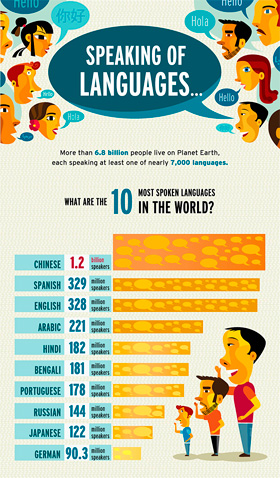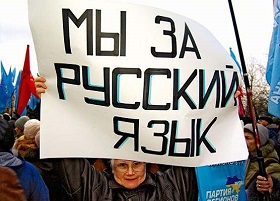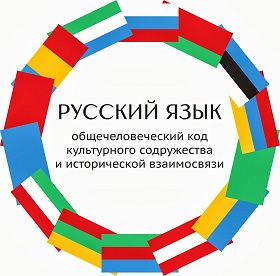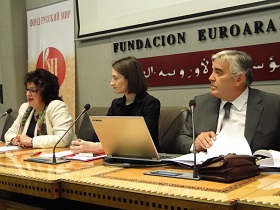Soft power of the Russian word
In
Login if you are already registered
(no votes) |
(0 votes) |
Editor-in Chief, Russkiy Mir Journal
The Russian language by right represents the cultural and historical base of Russia’s statehood and an indispensable means to express the values of the entire Russian World. It ranks among the leading languages of the world, and serves as one of the UN’s six official languages and a medium of international, ethnic and cultural exchanges. At the same time, the disintegration of the USSR was a heavy blow on the status of the language. The number of Russian speakers has reduced considerably. Russian is the only one of the major languages that has suffered heavy losses in its status the world over in the past two decades. Can this trend be reversed? Can the Russian language in our time act as an effective instrument of Russia’s soft power in the world arena?
The Russian language by right represents the cultural and historical base of Russia’s statehood and an indispensable means to express the values of the entire Russian World. It ranks among the leading languages of the world, and serves as one of the UN’s six official languages and a medium of international, ethnic and cultural exchanges. At the same time, the disintegration of the USSR was a heavy blow on the status of the language. The number of Russian speakers has reduced considerably. Russian is the only one of the major languages that has suffered heavy losses in its status the world over in the past two decades. Can this trend be reversed? Can the Russian language in our time act as an effective instrument of Russia’s soft power in the world arena?
Giving Way
In the past twenty years, there has been no major language on earth that had its status eroded as fast as Russian. At the beginning of the 20th century, there were around 150 million Russian speakers. These were chiefly subjects of the Russian Empire. The spread of the language geographically more or less neatly coincided with the borders of the Empire. By the time of disintegration of the Soviet Union, the number of Russian speakers had increased to 350 million of which 286 million were residents of the USSR. That was the first time ever that the Russian language use extended on such a mass scale beyond the borders of a sovereign state. And it was then that it could to a certain extent be regarded as a factor of humanitarian influence that the Soviet Union had in the world.
However surprising this might look, Russian today, too, remains the most widespread language in Europe in the number of speakers, with over 150 million Europeans (other data put it at 144 million) considering Russian their native tongue, which includes, of course, European Russia, Ukraine, Belarus and Moldova. Russian in one way or another is a considerably in use in 33 countries across the world.

Infographic. Speaking of Languages
However, the main negative trend, that is, reduction in the numbers of Russian speakers and users, has so far not been overcome – not even in the countries where its positions have traditionally been strong. Regrettably, the Russian language is on the defensive even in the territories of CIS countries .
Russian still remains one of the world’s most widespread languages. The number of people having command of the Russian language varies in expert assessments. The federal Rossotrudnichestvo agency estimates that at least 270 million people around the world speak Russian. Optimistic assessments put the figure at up to 300 million. In this case, it is the first time ever that the number of Russian speakers abroad has exceeded the number of citizens of Russia itself. Of course, not all of them are ethnic Russians.
However surprising this might look, Russian today, too, remains the most widespread language in Europe in the number of speakers, with over 150 million Europeans (other data put it at 144 million) considering Russian their native tongue, which includes, of course, European Russia, Ukraine, Belarus and Moldova. Russian in one way or another is a considerably in use in 33 countries across the world.
Yet another interesting and optimistic trend is that Russian has become the second popular language of the Internet, with 5.9% of all sites using it. It is the most used language on the web sites of ex-Soviet republics, including the coverage of 79.0% in Ukraine, 86.9% in Belarus, 84.0% in Kazakhstan, 79.6% in Uzbekistan, 75.9% in Kyrgyzstan and 81.8% in Tajikistan. Even this fact alone already creates objective conditions for the Russian language to become a factor of soft power as addressed, in the first place, to future generations.
The Technology of Unseating
However, the main negative trend, that is, reduction in the numbers of Russian speakers and users, has so far not been overcome – not even in the countries where its positions have traditionally been strong. Regrettably, the Russian language is on the defensive even in the territories of CIS countries where, one would expect, the wealth of historical and cultural traditions could for decades to come serve at least to keep up the language inertia. However, the pressure to unseat it from public and cultural practice is too heavy. There is an impression that some sort of a plan is underway to uproot the Russian language altogether, with a political motivation discernible behind it.
One of the most widespread methods to expel Russian from the sphere of education in CIS countries is mass-scale closure of Russian schools or transferring them to the category of schools with only individual specialized Russian classes. The abolition of education systems with teaching in Russian results in a loss of cultural and historical heritage for millions of Russian speakers who have long resided beyond Russia’s territory. This, in turn, is bound to subvert Russia’s status internationally and its influence in humanitarian areas.
The general trend in the policies of most CIS and Baltic countries with regard to the Russian language has been as follows: Russian speakers were allowed to use the language as their mother tongue in the early years of independence, then as their second mother tongue, then as a means of inter-ethnic communication, further – the language of ethnic minorities, and, finally, merely gone of the languages chosen for study or even an optional subject in the curriculum. Today, Russian is the second official language in Belarus and has the status of official in Kyrgyzstan. In government organizations and local municipal bodies in Kazakhstan, Russian is used as an official language on a par with Kazakh. However, there are plans discussed in this republic to give up the use of the Cyrillic alphabet for the native language, which will inevitably subvert the positions of Russian.
Stop Retreating

Mass protests to support the Russian language
in Ukraine
If the present negative trends towards shrinkage of the Russian language coverage persist in the coming 10 or 15 years, then we can expect that the number of Russian speakers in various countries will by 2025 fall to some 150-152 million, which means a retreat to the level of the early 20th century.
Unfortunately, Russia in recent years has been unable to withstand the trend towards closing down the system of Russian language study in other countries either: the numbers of students of Russian as a foreign language have dwindled there sharply. It is only now that the need to resume the activities of Russian language centers has become obvious. However, great numbers of experienced teaching staff have already been lost, and the work will have to be started nearly from scratch.
If the present negative trends towards shrinkage of the Russian language coverage persist in the coming 10 or 15 years, then we can expect that the number of Russian speakers in various countries will by 2025 fall to some 150-152 million, which means a retreat to the level of the early 20th century. In the Russian Federation itself, due to degradation of Russian language knowledge, the number of active users may fall to the level of not more than 110 million. The point is that already today, there is evidence that the level of the knowledge of Russian as the state language of the Russian Federation is falling among the younger generation, and the scope of its functioning as a means of inter-ethnic communication is shrinking. Furthermore, we cannot overlook the deplorable facts of distortion, often due to the lack of education, of standards of the Russian literary language in statements by political leaders, officials and civil servants, and people working in the areas of culture, television and radio broadcasting.
As an overall result, the popularity of Russian in the world in the coming 10 or 15 years may fall behind such languages as French, Urdu, Arabic, Portuguese and Bengali.
Recognizing Soft Power
At present, there is an understanding at top levels of the political leadership that the lack of consistency in Russia’s policy with regard to Russian as a world language impairs the country’s authority in the international community and its competitiveness on the world labor market. And it is also detrimental to the patriotic spirit and civic awareness of the younger generation. Let alone the ethno-cultural disunity of the population of Russia and other CIS countries that undermines the country's position amid the neighboring geopolitical environment.

Belorrussian schools, Summer 2013
Over the past decade, a whole series of specialized programs have been adopted as an instrument to spread and support the Russian language both in Russia and abroad. The meaning of soft power was for the first time legally formulated in the Concept of Foreign Policy of the Russian Federation that President Putin approved on 12 February 2013. Soft power is interpreted as an “integrated leverage to tackle foreign policy objectives with recourse to the potential of civil society and information, and communicative, humanitarian and other methods and technologies working as an alternative to classical diplomacy”. All of these efforts are directly linked to strategically important practical objectives: creation of a favorable environment and alliances, strengthening Euro-Asian integration with Russia’s participation, preservation of the nation inside Russia and outside it,and preservation and expansion of the Russian language coverage in the world and the culture of the entire Russian world.
Presently, the Russian Language Federal Target Program is underway, designed to cover the period of 2011-2015 and intended to support the Russian language in the Russian Federation and outside it. The program is sponsored by Rossotrudnichestvo and the Education and Science Ministry of the Russian Federation. Initially, the allocations for this program for the entire period of 2011-2915 amounted to around 2.5 billion rubles. It is expected that the program will make it possible, among other things, to increase the volume of information resources for the Russian language by 2.7 times, the number of teachers who have taken the retraining and upgrade courses in teaching Russian as a foreign language – by 3.5 times, and the publication of Russian teaching aids and textbooks for foreign students – by 2.25 times.
At present, there is an understanding at top levels of the political leadership that the lack of consistency in Russia’s policy with regard to Russian as a world language impairs the country’s authority in the international community and its competitiveness on the world labor market. And it is also detrimental to the patriotic spirit and civic awareness of the younger generation. Let alone the ethno-cultural disunity of the population of Russia and other CIS countries that undermines the country's position amid the neighboring geopolitical environment.
At the same time, it became obvious, following even the first stage in the implementation of this program, that money alone is not enough for the program to carry on. Its format, the lack of coordination among the government agencies involved, excessive bureaucracy, and reduction of allocations by 5% for the period 2013-2015 (due to problems of the federal budget) – all combined prevents any required coverage of the world’s countries and regions and of all those who would like to study and teach Russian abroad. The demand for Russian language courses is not satisfied adequately even in EU countries.
And yet, Russian language courses abroad have been recently expanded within the framework of this and other programs. Furthermore, according to specialists and officials working on the programs, the demand for Russian study is greater than the supply. The period of rejection of Russian as an “imperial language” is coming to an end. A pragmatic approach is setting in instead, and that also concerns the countries most chagrined about the Soviet past (like, for instance, the Baltic republics). No longer viewed as “Soviet”, Russian is becoming one of the important and promising languages for study and practical use in work, leisure, business, and so forth. The logic “any language but Russian” more and more often gives way to “why not Russian?”.
Under the programs that Russia sponsors today, around two thousand foreign students attend Russian language courses annually. Foreign teachers of Russian take retraining and qualification upgrade courses. Combined with application of distance-teaching technologies, which actually are not really used on a mass scale as yet, the number of teachers in this category already amounts to around 3 thousand. Approximately 160 Russian teachers work in some 40 countries, employed for classes in Russian and instruction in teaching methods. The largest courses operate at science and culture centers of Rossotrudnichestvo (56 centers in 50 countries). According to Konstantin Kosachyov, head of Rossotrudnichestvo, some 20 thousand students attend these Russian language courses.
An important role in popularization of the Russian language abroad is played by the Russian World Foundation set up by decision of the President of Russia in 2007. Today, RW runs nearly 100 centers and scores of separate class rooms – all engaged in a most important cultural mission that can by right be described as an instrument of Russia’s soft power.
These measures are, unfortunately, not enough. For indeed even among Russians residing abroad, numbering, according to the Foreign Ministry’s data, nearly 30 million, only one-third are in one way or another involved in the studies of Russian, which also includes their families. The coordination of activities of various government agencies is far below the required level. Only a relatively small number of Russian language teachers participate in the retraining and qualification upgrade programs. And although this number will in the near future increase first to 300 and then to 500, this just the same is but a drop in the ocean. If we recall Soviet times, Russian in what was then foreign countries alone was taught to 600 thousand people annually.
It will hardly be possible to achieve the same levels in any near future, but then there is really no need to try to achieve the level of statistics of the times of the USSR. However, the awareness of the importance of strengthening positions of the Russian language in the world, and the efforts made in this direction today open up prospects for a radical change for the better already in the foreseeable future.
(no votes) |
(0 votes) |





